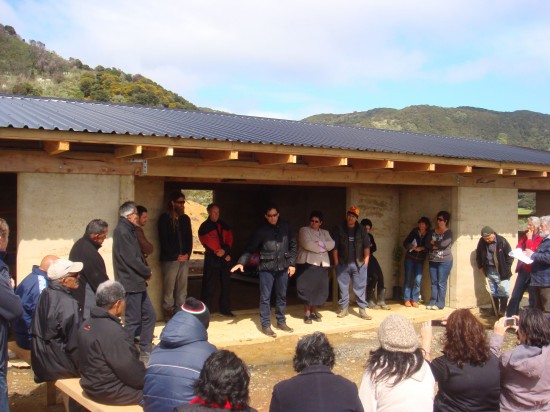Report and Resolutions
from
Ahipara Whareuku Housing Hui
Issues between council and hapu was a big part of the discussions for the Te Hiku o Te Ika Housing Hui held in Ahipara last Friday, but good commitments were given from the representatives present from FNDC, Whangarei Council, Maori Land Court.
Illegal and sub standard housing has been an issue trying to be addressed by hapu for a long time and a big concern discussed at this hui was the need to get maori into healthy, sustainable and affordable homes.
The hui was very well attended, whanau coming from Rawhiti roa, Kaikohe, Horeke and as far away as Ruatoria in the east coast to learn about alternative housing options for maori wanting to return home to their ancestral lands.
The reason for the hui in Ahipara was to show an alternative answer to maori housing issues, so it was an appropriate place to have a hui for this subject as the first ever whareuku built in Northland is being completed in Ahipara.
Presentations by Dr Kepa Morgan from the University of Auckland and from Rau Hoskins, Director of Tribal Designs Architect company gave excellent background information about the whareuku concept that had been the basic design concept for the project that the more than sixty participants in the hui went to visit onsite at Nga Karoro Rd in Ahipara. Unfortunately Jing Siong (John) Cheah, PHd student from the University of Auckland who was a very big part of this project, is presently studying at the University of Bath in England for 6 months so wasn't able to be present at the hui but will be back next year to continue thermal mass testing on the project house.
Kepa spoke about the whareuku system as he had been supporting it for over 15 years now. He gave a presentation on his experiences with councils and how he has influenced the Bay of Plenty council to accept these alternative solutions. "Councils don’t want to be held accountable for any liability. So if the Engineer clears it, and has insurance to cover them, then Council will be more accepting. But we want Councils to accept these approaches, not because they have no liability, but because this is the best way to go. "
He spoke about waste water management, erosion and especially about quality of workmanship and engineering. Don’t cut corners on building standards as the councils will come down hard on that sort of attitude. However, it was pointed out from the floor that most people who build their own homes do really professional jobs with a lot of effort of love put into their projects and that it’s the property developers who cut corners and do cheap jobs.
Rau Hoskins said that more time needs to be put into the entire stage of planning the house including the lanscaping, the natural energy assets for their site etc etc. North facing is so important for housing in Te Hiku o Te Ika because we have such a great climate. Cost effective design is important but so is quality design. Rau gave an excellent presentation that would help anybody about to build their home to look at some great savings on the maintenance of their home .
Ngawai Herewini, who is standing for local council spoke of exciting times ahead of us and solutions coming from the hapu and whanau are an excellent process she wants to support. The world is watching us and it’s a great time to live in Te Hiku o Te Ika.
Rueben Taipari Porter was the project coordinator for the whareuku project and he gave examples of his experiences of working with the whareuku system. The strength of the building surpassed any other type of home building material he had ever worked with including brick. He spoke about the Pompallier House in Russell built in 1841 using exactly the same technology as whareuku and it is still standing today in good condition as an example of the longevity of these homes.
Heeni Hoterene did the financial budget for the project and a close estimate for the build to date was under $50 000. Sponsorship from University of Auckland, GBC Cement Company and TPK were integral in the success so far of this project.
Rueben spoke about the serious issue of maori being a transient people today, with no solid foundations because they have no permanent abode to build a solid future on. Maori have become used to being translocated and this is a significant contributor to the social problems facing maori today. "How can we be tangata whenua when we cant stay in the one place long enough to understand and build a relationship with the land?"
The hui successfully brought together from the local community of Te Hiku, professionals in conventional and alternative housing systems, permeaculture, landscaping, national organic representatives, architects, engineers, builders and an awesome representation of Ahipara hapu keen to come and learn about alternative answers to their problems of housing.
The amount of people who attended the hui who have impressive skills in regards to housing was inspirational enough for the full support from the hui to establish a Regional Housing Group from those attendees present.
Resolutions:
a. Look at the whole process of Resource Consent applications, and lobby for Councils to do that work at a lower rate for these kinds of ‘healthy home’ projects: Tautoko
b. Establish a Working Roopu from this meeting: Tautoko
c. Establish a home-building data-base/ network: Tautoko.
d. Hold follow-up meeting, and invite Maori Land Court and Far North District Council: Tautoko.
e. Design a new permitting mechanism (including retrospective permits), and lobby for its implementation with Councils: Tautoko
f. Vote for Ngawai and she will lobby for improved systems in Council to facilitate healthy homes construction: Tautoko
g. Request Te Runanga o Te Rarawa to give more meaningful support to this hapu project and similar projects, and to integrate the korero from here into their Paa Kainga project: Tautoko
The building of the whareuku and the relationship between the asian and maori communities working together on this project will be shown on Asia Downunder on 12th September 2010 for those who are interested in the concept but missed the hui last Friday.







